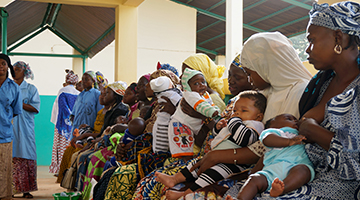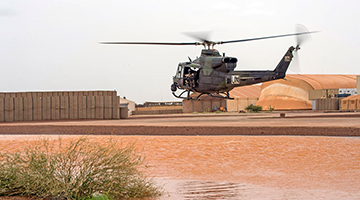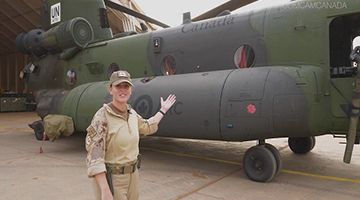Canada’s engagement in Mali

Follow:
Through an integrated approach, Canada is supporting Mali in its efforts to overcome the ongoing instability it has been facing since 2012, with the ultimate goal of helping to build a better future for all Malians. The country’s instability is negatively affecting the broader Sahel region, increasing the risk to Canadian investments and citizens, making it difficult for the Malian population, especially women, to actively participate in the peace process – thus exacerbating gender inequality– as well as threatening the stability of coastal West African states. In close collaboration with its international and regional partners, Canada contributes to efforts to achieve durable peace, sustainable development, and shared prosperity in Mali.
Diplomatic engagement

Photo credit: Shutterstock
Mali is one of Canada’s most longstanding country partners in Africa. It is also a focus country in Canada's National Action Plan on Women, Peace and Security to support women's empowerment, management and participation in the peace and reconciliation process and security efforts. Canada and Mali established diplomatic relations in 1969 and continue to maintain bilateral relations over half a century later, with a key foundation being Canada’s international assistance program in the country. Mali is represented in Canada by its embassy in Ottawa since 1978, and Canada is represented by its embassy in Bamako since 1995.
Canada has actively supported international efforts to restore stability in Mali since the 2012, 2020 and 2021 coups d’état. This has included political and diplomatic support to help broker a peaceful settlement of the conflict. To that end, Canada works in conjunction with the Government of Mali, the United Nations, and other partners to enable the effective implementation of the Agreement for Peace and Reconciliation in Mali, which is also known as the Accords d'Alger (in French only), and to support the return of peace and the protection of civilians in central Mali. Such efforts are complemented by an increased emphasis on stabilization programming.
Development
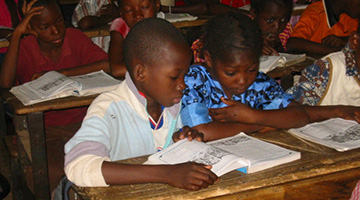
Photo credit: Canadian Embassy in Mali
Canada is a long-standing partner for promoting peace, security and sustainable development in Mali. Since 2000, Canada has provided over $1.8 billion in international assistance to Mali, including $119.9 million in 2021-2022. Following the August 2020 military coup, Canada suspended all Direct Budgetary Support to the Government of Mali, while maintaining humanitarian assistance, bilateral development and peace and security programming through trusted third-party partners to support the poorest and most vulnerable populations, where 44 % of Malians live below the national poverty line and 15.9 % live in extreme poverty.
Canada focuses its assistance on three main areas: 1) strengthening basic social services (health, education), including through large investments in sexual and reproductive health and rights since 2010; 2) rural development, including building resilience against climate change and access to inclusive financial services; and 3) the consolidation of inclusive governance to restore democracy. Canadian programming has led to meaningful results and made a real difference in the lives of the people of Mali.
In line with Canada’s Feminist International Assistance Policy, Canada's programming places women, adolescent girls and girls at the heart of all its interventions. Each project addresses an issue that hinders women's full participation and empowerment in a given sector of intervention. Given Mali's fragile socio-political and security context, Canada is taking a conflict-sensitive approach and working closely with various stakeholders to implement agile and integrated programming that is consistent with peace, security and humanitarian needs.
For more information on Canada’s development projects in Mali, consult the Project Browser. To learn more about the impact of Canada's development assistance to Mali, please see the Mali success stories.
Humanitarian assistance
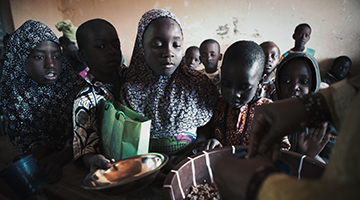
Photo credit: OCHA/Tanya Bindra
Canada’s humanitarian funding in Mali supports a gender-responsive, multi-sectoral response to the needs of populations affected by conflict and natural disasters, such as drought. Canada is working with experienced humanitarian partners such as the United Nations and the Red Cross to provide vital assistance to crisis-affected people in Mali, including Internally Displaced Persons (IDPs), returnees and host communities. Canada’s assistance is helping to provide food, treatment for acute malnutrition, drinking water, sanitation facilities, health services (including sexual and reproductive health services), and protection services to vulnerable populations, including to address needs resulting from the continued violence against civilians, particularly women and children.
Trade relations

Photo credit: Shutterstock
Canada and Mali’s trade relationship is characterized by Canadian private sector investments in the mining sector. In 2021, Canadian direct investments in Mali totalled nearly $1.5 billion. The combined Canadian private sector investments in Mali make Canada one of the top sources of investments in the country. These investments have become an important economic lever that contributes significantly to Mali’s fiscal revenues as well as to local development. In 2022, bilateral merchandise trade reached $29.9million, including $26 million in exports and $3.9 million in imports. In 2019, bilateral merchandise trade reached $29.5 million, including $26.6 million in exports and $2.9 million in imports.
A Foreign Investment Promotion and Protection Agreement (FIPA) became effective in June 2016, which promotes and secures investment between the two countries.
Promoting peace, security and stabilization

Photo credit: RCMP
Canada supports Mali’s peace and reconciliation process through a range of activities that seek to improve security and stability in the region, support counter-terrorism efforts, and encourage dialogue between key stakeholders with the ultimate goal of helping to establish a lasting peace in the country.
Canada recognizes that an inclusive political process with an increased and meaningful participation by women is critical to achieving a durable peace in Mali. Canada is supporting the implementation of all four pillars of the Accords d’Alger (French only): political reform; defence and security sector reform; development; and reconciliation, justice and humanitarian affairs. Canada is providing this support through financing and deployments within the United Nations Multidimensional Integrated Stabilization Mission in Mali (MINUSMA) as well as through civil society partners to build local and regional capacity to increase meaningful participation in peace operations and conflict prevention.
Peace and Stabilization Operations Program
Canada’s Peace and Stabilization Operations Program (PSOPs) is funding stabilization programming in Mali and the Sahel. Canada has invested more than $30 million from 2016-2019 and is providing an additional $28 million between 2019 and 2022 in Mali and the Sahel in support of civil society organizations, international non-governmental organizations, and the United Nations, among others. Canada is also providing $19.8 million to the MINUSMA Trust Fund (2016-2024) and supports the deployment of two gender advisors to the mission.
PSOPs programs in Mali are helping advance the implementation of the Accords d’Alger, promote the inclusion of women at all levels of the peace process and its implementation, support UN-led peacebuilding and stabilization efforts, and foster dialogue and understanding among conflict-affected communities, particularly supporting women and youth as agents of peaceful change. For more information, consult the interactive Project Browser. For more information about Canada’s policy on women’s participation in conflict prevention, conflict resolution and peacebuilding, consult its website on Canada’s National Action Plan on Women, Peace and Security.
The various initiatives supported by the PSOP continue to produce concrete results. For example, as result of a project with Search for Common Ground, 350 peace ambassadors, of which 151 were women, were trained on leadership, conflict transformation, and peacebuilding in Central and Northern Mali.
These ambassadors led local assessments of conflict in 12 communities and initiated 70 peace initiatives to address these conflicts. Themes addressed included community dialogue to resolve inter-communal tensions, mediation of land conflict issues, building capacity of traditional mechanisms in conflict resolution, involving youth and women in peace-building efforts with security forces, and organizing peace-building activities to encourage better social cohesion and confidence building amongst communities.
Operation PRESENCE
The Canadian Forces' contributions to the government's peace operations strategy are collectively known as Operation PRESENCE. Canada is committed to providing valuable military capabilities to a variety of United Nations peacekeeping missions.
The first of these deployments was an air task force that operated from Aug. 1, 2018, to Aug. 31, 2019, within MINUSMA. The task force included three Chinook helicopters used to provide MINUSMA with critical emergency transport and logistics capability, as well as 5 Griffon helicopters tasked with providing armed protection escort. The task force was deployed for 1 year to Gao in northern Mali and conducted 11 medical evacuations and more than 100 transport missions. The Canadian helicopters accumulated more than 4,000 flight hours, transported approximately 2,800 passengers and delivered more than 167,832 kg of cargo. This contribution has provided essential support to MINUSMA, a key element in the implementation of the Accords d’Alger.
With the completion of the Air Task Force’s deployment, Canada continues to make multiple contributions in support of the MINUSMA, including up to 10 Canadian Armed Forces staff officers, civilian police officers and financial support, with the aim of facilitating the implementation of the Accords d’Alger.
Canadian Police Arrangement
Since January 2019, Canada has been deploying police officers to Mali in support of the implementation of Mali’s Peace and Reconciliation Agreement and reform of Mali’s security services. Deployments occur through the Canadian Police Arrangement, a partnership between Global Affairs Canada, the Royal Canadian Mounted Police and Public Safety Canada. Canadian police are providing advice and leadership on issues such as community policing, human rights and gender equality. Canadian police officers are serving with MINUSMA and some have served and deployed under the European Union’s civilian capacity-building program, EUCAP Sahel Mali. Currently, no police officers are deployed under the EUCAP Sahel Mali mission.
Photo galleries
Video gallery
- Date modified:
